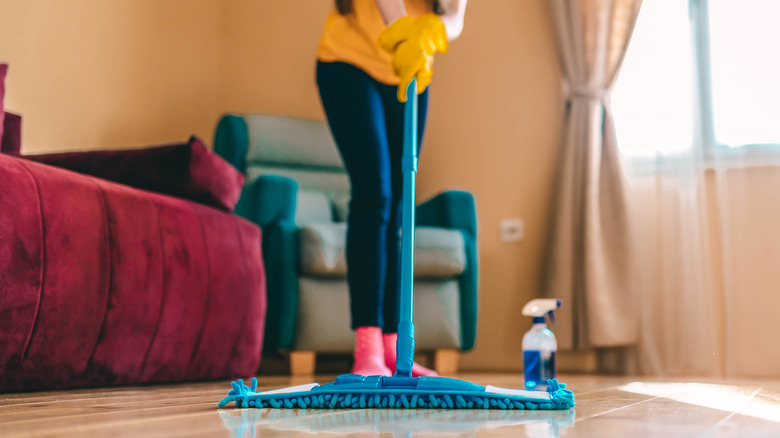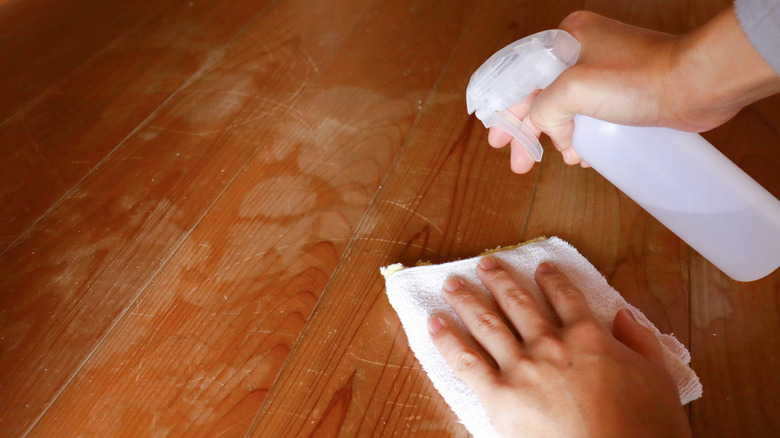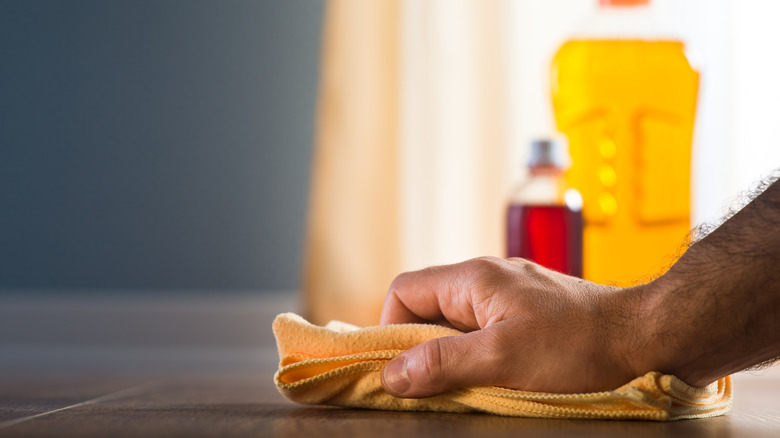This Kind Of Floor Cleaner Is Doing More Harm Than Good To Your Wood
We may receive a commission on purchases made from links.
Hardwood floors are a great asset in a home and are impressive to look at. However, a lot of work goes into keeping them that way. Although a thorough cleaning is only needed once or twice a month, keeping them free of dust, crumbs, and other miscellaneous debris is a daily responsibility. Such maintenance requires the proper tools and using products too harsh for wood flooring can create a larger problem. Even the cleaners that initially come across as beneficial can cause irreversible issues with your floors in the long run. Avoid using oil soap to clean your hardwood floors, since it can leave behind a streaky, sticky residue and cause permanent fading over time.
Natural wood is one of the more valuable (and expensive) flooring options on the market, with installation costs set as high as $25 per square foot for certain varieties. As such, it's in your best interest to keep those wood floors in pristine condition for the duration of your time in the home. This allows you to avoid costly repairs and may lead to a higher resale value if the time ever comes to put your house on the market. Even cheaper wood-inspired flooring, like vinyl or laminate, can deteriorate from the use of oil-based cleaners. Keep reading to learn more about the dangers of using oil soap as a floor cleaner, including the extent of damage they can cause, and take a look at some safer alternatives to use in their place.
How oil soap can damage wood floors
Oil soap is a popular cleaning solution branded as a more natural alternative to chemical-based cleaners. Touted as a product used to clean floors and furniture for generations, Murphy's Oil Soap in particular is made from Citronella oil, sodium tallate, and other various chemicals that aid with bonding and overall product performance. While the glistening shine that oil soap leaves on flooring may look nice after it's applied, this "shine" will turn into an unattractive residue as the product dries, often leaving streaks along the floors and feeling sticky to the touch. Despite being labeled as a floor cleaner, oil soap gives wooden floors more of a surface-level polish than a thorough clean, with the slick varnish causing the underlying dirt and debris to stick to the surface rather than pick it up. Continued use of the oil-based product without cleaning your floors properly can cause the flooring to fade and become dull over time. Such changes are usually permanent, meaning you'd have to refinish your floors or replace the planks exposed to the product in order to bring back the wood's original appearance.
The overall cost of refinishing hardwood floors depends on the extent of the damage. So, the longer you wait to address the problem, the more you'll have to pay for repairs. These projects normally average between $1,200 and $2,400 in price. Oil soap produces a similar effect on laminate flooring but is usually cheaper to replace.
Wood-friendly products to use instead
The floor cleaners best suited for natural wood have a neutral pH, meaning their level of acidity is 7 on the standard 14-point pH scale. These cleaners help your wooden floors look their best by removing stray dirt and dust without harming your floor's finish. There are many brands of hardwood floor cleaners available, and no two products are the same, so feel free to experiment with different formulas until you find one that works for you.
Bona is one of the most commonly referenced manufacturers of wood-friendly cleaners. While Bona floor cleaners have their share of critics who claim they don't clean consistently across different types of wooden floors, others say the products work well and leave no residue. Surface cleaning brand Weiman also makes a cleaner for hardwood floors that have received impressive reviews on websites like Amazon and Home Depot. No matter which product you end up choosing, make sure to follow the instructions provided to achieve the best results for your floors. It's best to use these products with a microfiber cloth or mop — tools gentle enough to avoid scratching yet durable enough to provide the deep cleaning your floor needs.


